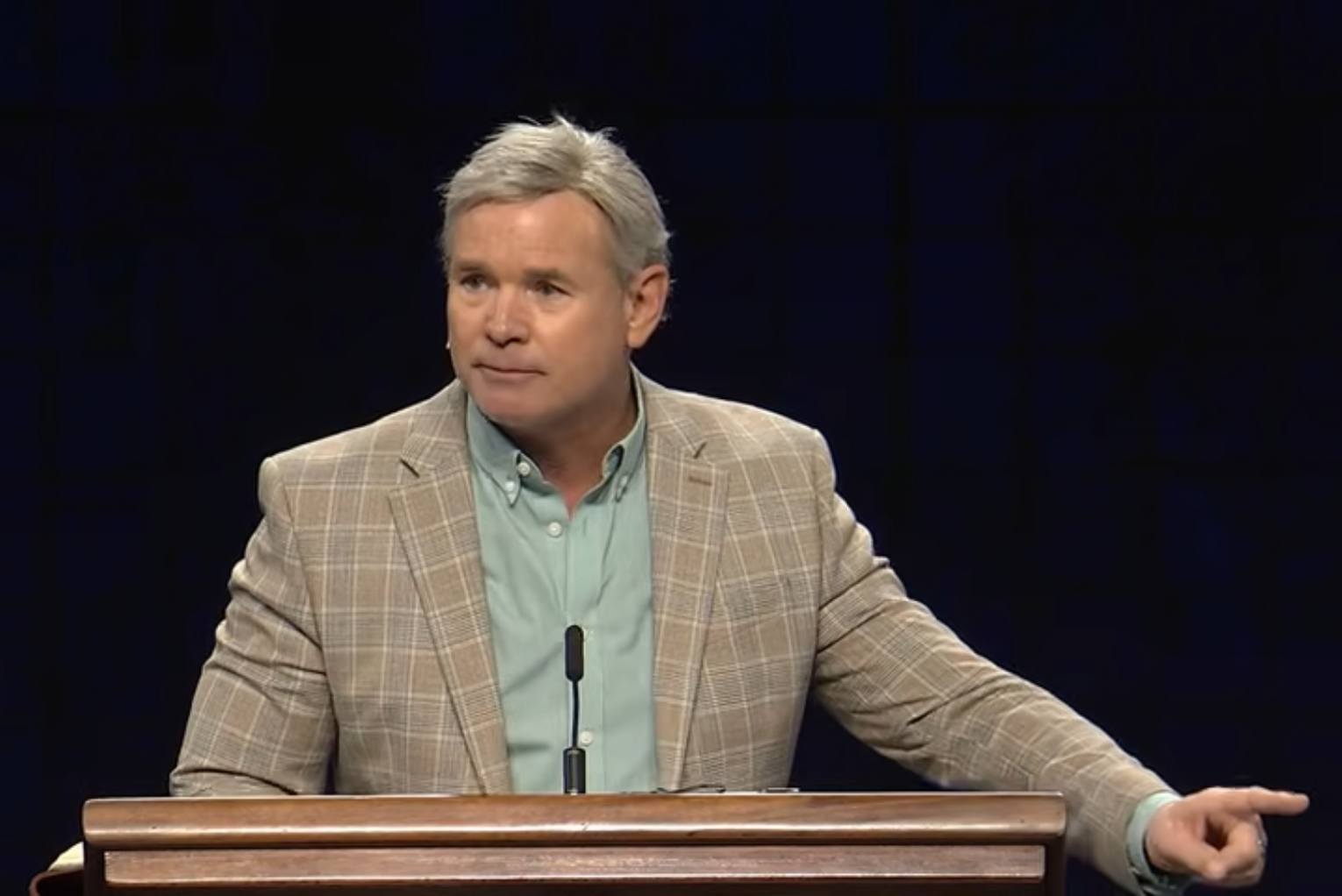Deaf people often are stigmatized by society—and even by the church. But deaf ministries accrosss the United States are using Spirit-led sensitivity to reach those who cannot hear.
A chill fills Minnesota’s night air as about 30 people gather at Pleasant View Deaf Assembly of God in Spring Lake Park, a Minneapolis suburb. Animated conversations, pointing and hand movements punctuate the cedar-lined sanctuary. A young man laughs repeatedly.
“Obviously it’s a Saturday,” remarks Rod Smith–using sign language, or “signing”–as he observes the boisterous fellowship. “You enjoy Saturday?”
A hearing pastor called into this ministry because of his parents’ deafness, Smith follows his question with a loud whoop. Though most can’t hear it, they shout back.
Soon Dan Herod, another hearing son of deaf parents, is leading vibrant praise music that sends vibrations humming through the pews. Songs such as “Awesome God,” “Look What the Lord Has Done” and “We Bring the Sacrifice of Praise” echo throughout the room. Many close their eyes or lift their hands skyward.
“Don’t be afraid to use the gifts of the Spirit,” Smith encourages the worshipers. “The Spirit of the Lord is here.”
After the worship time Belinda McCleese, a deaf minister and conference speaker, asks the crowd how God has been speaking to people. One man describes the Lord bringing him an opportunity to reach the lost.
Another relates the pain of the impending 17th anniversary of his divorce and shares how the end of his marriage parallels his wandering from God for many years. Now the Lord is inviting him back into His presence, he says. Returning to a pew, the man slaps hands with several well-wishers.
Later, one of the five African Americans in the congregation recalls her experience as a prodigal. But now, she says, she has an awareness of the Lord’s continuing love. Five people surround her and lay hands on her. After their prayer she signs, “Thank you for loving me.”
The woman’s admission fits with McCleese’s sermon based on Isaiah 54:10. McCleese reminds the audience how this verse assures us of God’s unconditional, steadfast love. Using a modern illustration, she refers to seeing the movie Titanic and weeping profusely over the young man who gave his life for the heroine.
“How many of us are willing to stand in the gap like that?” asks the church’s former associate pastor, hands and arms moving in fluid motion. “That’s what agape love is all about. It’s about the willingness to sacrifice for someone else. Agape wants no exchange; it refuses to look for applause or acclaim.”
This animated scene is a contrast to church services the next morning in southwest St. Paul. Amid frigid weather, 14 people filter into the sanctuary at Twin Cities Deaf Church.
The quiet atmosphere seems to fit with the textured, white plaster walls and burnished wooden pews. When praise and worship starts, no music sounds. Instead, Bev Hill taps her chest, waves her hand and wiggles her fingers as she leads a song titled “Gone.”
But the lack of audible melodies doesn’t deter worship. As she moves on, Hill mouths some of the words. Others move their hands to silently declare: “He serves me, keeps me, wonderful friend of mine / Every day with Jesus is sweeter than the day before / Christ is the answer to all my wants / Jesus is all I need.”
Despite the church’s calm atmosphere, pastor Emory Dively speaks on a hot subject: the need to give. Using 2 Corinthians 9:6-10 as his text, he begins by discussing the pressures everyone faces to pay for the cost of living. The way his teen-age son drinks milk, he thinks it would be cheaper to buy a cow. Maybe when 15-year-old David goes off to college, he’ll finally be able to afford a sport utility vehicle, Dively quips.
Next, Dively notes that some deaf people rely on pensions or other fixed incomes. And he insists it’s spending habits not poverty that ultimately make the difference.
“The story in the Bible…one farmer sows a little seed, and that’s enough. Another sows a lot of seed, and when he harvests the crop, he can sell it for a lot of money. But who owns the seed? It’s God’s. Money is man-made, but it’s God who takes care of us.
“When I grew up, I got a lot of things from the government and learned how to receive,” Dively concludes. “When I became a Christian and learned to give, it was a new concept. Deaf culture is get, get, get. But that’s not Christian culture. We give.”
A Forgotten Mission Field
Despite differing worship styles, these two congregations symbolize America’s deaf churches. Small, underfinanced and usually led by bivocational pastors, they struggle to convince hearing Christians that their world represents a vital missions frontier.
The deaf are one of the last groups to be reached with the gospel, says David Stecca, president of Deaf Video Communications in suburban Chicago. As an example, he points to the lack of missionaries heading overseas to target deaf audiences.
“Right now we’re still in an uphill battle to get the church to recognize the deaf as a mission field,” says Stecca, who is able to hear. “Getting the hearing world to understand there is a deaf culture which the hearing church does not reach is a concept most people don’t understand.
“I’ve had pastors tell me, ‘There are no deaf people; if there were they’d show up at my church.’ I ask, ‘If [they did], what would you do to minister to their needs? Read lips?'”
Sharon Berry, a member of Birmingham Community Deaf Church in Alabama, says the deaf community needs another 100,000 souls to both catch the vision and join the effort. A hearing child of deaf parents, Berry helped organize the fledgling Deaf Evangelical Agencies in Fellowship for Christ to better coordinate multiple outreaches. She sees a lack of resources and opportunities to interact with the larger body of Christ as symptoms of communication barriers.
“I look at people on the front lines and my heart grieves,” Berry says.
Kevin Babin, national representative for deaf culture ministries in the Assemblies of God, says Christians could take a major step forward by simply adding closed captioning to all videos.
“Their first choice would be The 700 Club in sign language, but they realize that may not happen,” says Babin, who is not deaf. “But the church as a whole, with anything they produce, could caption it. Youth, boys, girls, singles, adults–every group has deaf people. The church as a whole needs to improve reaching these people with materials.”
Nor does reaching the deaf necessarily call for arduous efforts, McCleese observes. She suggests that if concerned Christians are too busy to master sign language they simply learn a few basic sign greetings. They also can be more assertive in communicating, using a notepad if necessary.
“With deaf leaders, be supportive of the deaf pastor’s mission,” she says. “Deaf people need support and camaraderie; they need to bounce ideas off people. Without communication we lose a sense of ‘peerness.'”
Because it is difficult to ascertain the precise definition of deafness–which can be partial and is not requested on census forms–population estimates of the deaf vary widely. In the United States, numbers range from 15 million to 28 million. Gallaudet University in Washington, D.C., the world’s only liberal arts university for the deaf, pegs it at 20 million.
Worldwide, some experts place it at 78 million. But other ministries include in their count the hard of hearing, aging seniors or others with partial hearing ability, resulting in numbers as high as 364 million.
Mike Buus, a hearing man and president of Deaf Opportunity Outreach International (DOOR), a global missions agency based in North Carolina, favors a count of 25 million to 40 million profoundly deaf people. This is defined as those who have never heard, who often can’t read or write, and whose primary means of communication is sign language.
However, Buus says the important issue is not numbers, but that millions desperately need the gospel. Only 6 percent to 8 percent of the U.S. deaf population regularly attend church. Worldwide, the estimate drops to between 1 percent and 2 percent.
“If you took them all and put them in one place, there would be all kinds of agencies, missionaries and everyone trying to reach them,” Buus comments. “But because they’re scattered all over the place, they’re overlooked.”
Or at least hindered. Pentecostal missionary, pastor and educator Albert Linderman blames cultural misunderstandings for creating huge gaps between hearing Christians and their deaf brethren. For example, negative attitudes toward dancing in some conservative denominations put deaf ministries at odds with their leaders, he says. Yet choreographed movements are a powerful means of communicating in deaf society.
Linderman, who can hear, has a doctorate in intercultural studies and extensively researches deaf culture. He says charismatics and Pentecostals often pose a significant barrier to winning converts among the deaf community. While much of the evidence is anecdotal, many people, particularly those in developing countries, view the deaf as needing healing. Linderman says this emphasis creates a harmful, paternalistic view.











































